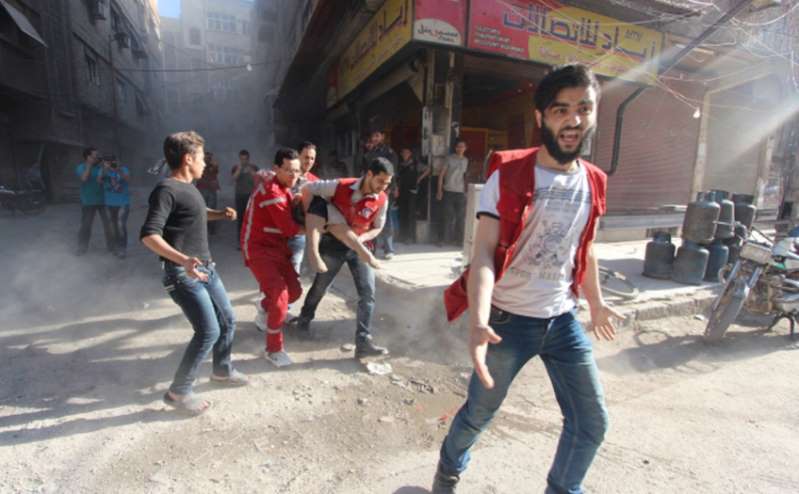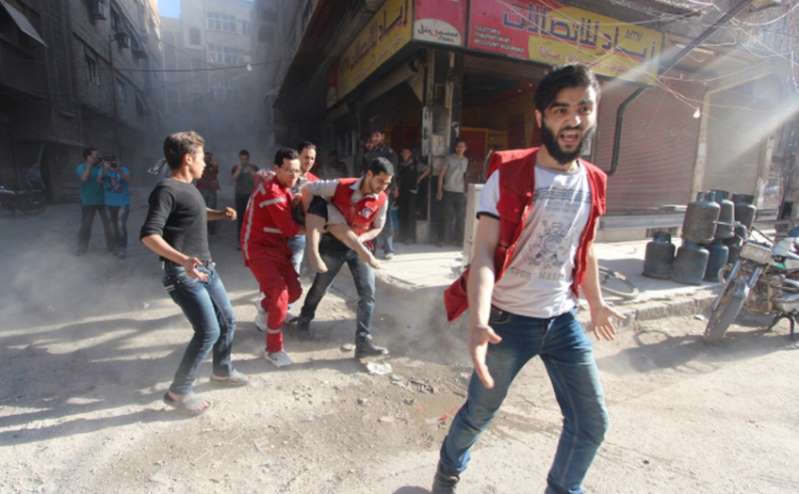
The civil war in Syria, which began in March 2011, has lasted ten years and has had a significant impact on the younger generation of Syrians. Its consequences were studied by the Ipsos research company commissioned by the International Committee of the Red Cross (ICRC) (the research results are at the disposal of RBC). According to her survey, eight out of ten young people in the country experienced periods of absence or extremely limited access to basic necessities, two-thirds were forced to leave their homes, more than half – to interrupt their studies, and among young men one in seven were injured.

1.4 thousand Syrians aged 18 to 25 took part in the Ipsos survey (800 people were interviewed in Syria, 400 in Lebanon, 200 in Germany).
It is on the shoulders of a generation that has taken away childhood and adolescence from years of violence that will bear the brunt of the responsibility for rebuilding the country and all the work involved, said Fabrizio Carboni, director of the ICRC's Geneva Regional Office for Operations in the Near and Middle East.
Loss in the family
Of those who continue to live in Syria, almost half have faced the death of a family member or close friend. Among those who left to live in Germany or Lebanon, one in five experienced such losses. During the conflict, three out of five young Syrians were forced to leave their home. This led to the severing of family ties. About 40% of young Syrians living in their home country have lost contact with close relatives. Of those who moved to Germany, 55% of those surveyed said that it was impossible to contact some family members, in Lebanon – two-thirds. For many, the conflict ruined plans to start their own family – one in five of those surveyed in Syria was forced to postpone their wedding.
Social networks allow keeping in touch with relatives and friends – more than 70% of young people living in Syria and Germany keep in touch with old friends. For those who live in Lebanon, this is more difficult because of the weak telecommunications infrastructure.
According to the UN, the total number of victims of the conflict in Syria, which began in 2011 as a local confrontation and gradually developed into an uprising against the regime of Bashar al-Assad, as of 2016 was estimated at 400 thousand people, in recent years the number of victims is estimated at 600 thousand. . person.
According to the UN Refugee Office, 5.6 million people were forced to leave the country, another 6.6 million became internal refugees.
The largest numbers of Syrians have found refuge in neighboring Turkey, Lebanon and Jordan. The situation in Lebanon is complicated by the absence of formal refugee camps and the economic crisis in the country.
Education gaps
Before the war, Syria had a high level of enrollment in education: 93% of young people studied in high school (2.8 million people), 650 thousand students were enrolled in universities (the pre-war population in the country was estimated at 21 million people).
Today, more than half (57%) of the young Syrians surveyed reported that because of the war, they either did not study at all, or were forced to skip several years of school (43% of respondents did not interrupt it). 3% of survey participants did not go to school at all.
As a result, there is a gender bias in Syrian universities: three quarters of students are now girls.
The main reason for missing school was the need to move – a third of those surveyed said this. For 15% of the respondents, the school was closed, for 12% it was destroyed.
The difficult financial conditions of the Syrians living in Lebanon are the reason for the low accessibility of education for the younger generation. Those who fled to Germany are much more successful in this sense: 90% of the respondents studied in high school, almost a third of young people were able to go to university, among girls this figure is higher.
Lack of finance
Young Syrians living in Lebanon and Syria say work is their number one need. The conflict has deprived of the means of income every third in Syria, in Lebanon – it is 70%. Every sixth young man living in Syria has no source of income, among girls there are a third. The most popular ways to cope with the lack of money were switching to cheaper products, spending savings, selling property and leaving a family member to work in other areas and countries.
The financial situation of Syrians living in their homeland and in neighboring Lebanon may worsen even more this year, predicts The New York Times. The Syrian economy is in a difficult situation, including due to tougher US sanctions: the Syrian pound in February hit its lowest since the start of the war, and food prices have doubled since last year. The UN World Food Program warns that 60% of Syrians (12.4 million people) are at risk of starvation.
The inability to fulfill dreams, the loss of relatives, financial difficulties, lack of food – all this affected the physical and mental health of young Syrians. Over the past year, nearly half of them have struggled with stress and depression. Especially emotional stress is typical for Lebanese people, mostly girls. Respondents cite healthcare as one of the hardest-to-find resources. In Lebanon, 53% of Syrians live without medical care. In Syria, this figure is slightly lower.

